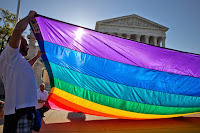 Speaking of same-sex marriage, the big news on that front is of course the oral arguments on the case before the Supreme Court, which took place on April 28.
Speaking of same-sex marriage, the big news on that front is of course the oral arguments on the case before the Supreme Court, which took place on April 28.And of course there were massive doses of phrase-parsing and tea-leaf reading, trying to guess what each justice is thinking and how they will vote, with some suggesting same-sex marriage is in trouble at the Court and others saying it had been a great day for marriage justice.
I have to tell you that all that is a colossal waste of time. Oral arguments may give you a whisper of an idea of what may come, but little more, if that. For one thing, justices will often ask what seems to be a hostile question in order to give the representative of a side they may be leaning toward the opportunity to make a point or raise an argument that hadn't been made. More particularly, many observers expect a 5-4 vote either for or against same-sex marriage, with Anthony Kennedy being that fifth vote in either case, so a great deal of attention was paid to what he said. But Kennedy has a frequent, even a normal, practice of asking hard questions of both sides in a case, so you can't really tell from that, either. We're just going to have to wait.
 |
| Anthony Kennedy |
That said, until a favorable decision is actually announced, the possibility of a loss exists. A loss at the Supreme Court, yes, would be a heavy blow to the move for same-sex marriage (and overall LGBT) rights - but it would not be a fatal one.
Consider that one of the arguments against same-sex marriage, made in several guises during oral arguments, is that it is so very new and so people aren't ready for it. But people are ready for it, as poll after poll after poll shows clear, even heavy, majorities of Americans supporting that right.
The latest example is a Washington Post-ABC News poll from mid-April: It found that 61 percent of Americans support the right to same-sex marriage and only 35 percent are opposed - that is, Americans support the right by close to a 2-1 majority. Support is even higher in the states where same-sex marriage is now recognized - but even in the states where its not, a majority of 54 percent say it should be. Meanwhile, 61 percent oppose allowing individual states to prohibit same-sex marriages and 62 percent support requiring states to recognize same-sex marriages performed in other states.
The Supreme Court can speed up that move toward justice or it can hinder it - but it can't stop it. I keep saying it because it remains true: On this, if on nothing else, justice will come.
Sources cited in links:
http://www.washingtonpost.com/news/post-nation/wp/2015/04/28/supreme-court-hears-arguments-in-same-sex-marriage-case-obergefell-v-hodges-today/
http://www.nytimes.com/2015/04/29/us/supreme-court-same-sex-marriage.html
http://www.slate.com/blogs/outward/2015/04/28/marriage_equality_arguments_first_reaction_ginsburg_strikes_kennedy_wavers.html
http://www.washingtonpost.com/page/2010-2019/WashingtonPost/2015/04/23/National-Politics/Polling/release_395.xml
http://www.washingtonpost.com/politics/courts_law/poll-gay-marriage-support-at-record-high/2015/04/22/f6548332-e92a-11e4-aae1-d642717d8afa_story.html




No comments:
Post a Comment